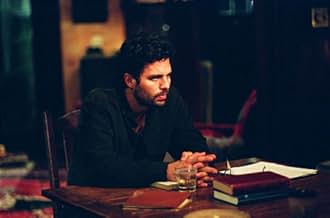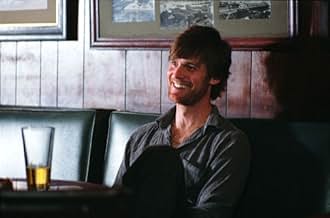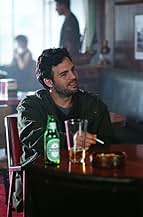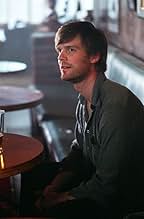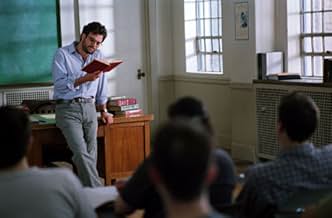An indiscretion between two close friends tears down their respective marriages.An indiscretion between two close friends tears down their respective marriages.An indiscretion between two close friends tears down their respective marriages.
- Awards
- 2 wins & 4 nominations total
- Director
- Writers
- All cast & crew
- Production, box office & more at IMDbPro
Featured reviews
If "We Don't Live Here Anymore" had been made in the 1960s, it might have been titled "Jack and Terry and Hank and Edith". To borrow the title of another celebrated 60s film, "We Don't Live Here Anymore" is about carnal knowledge in the 21st century.
The film has a few interesting lines in it. Some have a hollow ring to them. Take the statement that "Even adultery has morality to it." The film does not appear to bear this out. Right or wrong don't seem to come into the picture at all. It seems as if anything goes as long as it makes people "happy". As Hank (Peter Krause) says, "It's easier living with a woman who feels loved" -- even if it is by your best friend Jack (Mark Ruffalo). Far closer to the truth is Mark's comment to his children that the arguments they overhear between their parents are just "adult foolishness". They certainly seem to be compared to the savvy of the kids, who are old beyond their years.
The situation (and the situational ethics) of the film may seem a tad unreal or surreal. But the film is solidly grounded in reality, as embodied by the environment in which the two couples live -- their home lives, their children, the very houses they inhabit.
The music of the film is well chosen, alternating between the drama of operatic or chamber music, and jazz rhythms that sound like a jungle beat -- the beat of sexual heat and passion.
The best of the four lead actors is Laura Dern as Terry. To my mind, she is the only fully rounded and entirely comprehensible character. Dern's setpiece speech about her husband treating her like a dog has the ring of Oscar to it. To be frank, Dern's shaggy mane and thin frame make her look a lot like a dog -- an Afghan or a Lhasa Apso, perhaps -- but she should definitely not be written off as a bitch. On the contrary, we understand and sympathize with her drinking and her anger at being cast aside by her wayward husband Jack.
Mark Ruffalo, as Jack, is harder to understand and to sympathize with. He comes across as too self-centered and callous. Even in his treatment of Edith (Naomi Watts), he seems to think only of himself and his sexual needs. He claims to "love" her, but their relationship is essentially physical. Jack is basically a wuss and a coward who, when push comes to shove, cannot leave his wife and cannot even be honest with his kids about how things stand between their parents. And you get the definite impression that Jack cares more about the children than about Terry. (That being said, the camera absolutely loves Mark Ruffalo with his dark, liquid brown eyes and full, sensual lips.)
By comparison, Peter Krause (Hank) and Naomi Watts (Edith) are less interesting and more like plot devices than real people. Hank is a professor and author with writer's block who has the hots for one of his students, but not for his pretty wife. Hank is no slouch himself in the looks department, but Edith's interests lie across the fence. It is even harder to understand their motivations than Jack's.
Still, "We Don't Live Here Any More" is a fascinating look at modern sexual mores, and Laura Dern is a powerhouse who lights up the screen. Again, don't be surprised if her name is put forward for the coveted golden statuette. You heard it here first!
The film has a few interesting lines in it. Some have a hollow ring to them. Take the statement that "Even adultery has morality to it." The film does not appear to bear this out. Right or wrong don't seem to come into the picture at all. It seems as if anything goes as long as it makes people "happy". As Hank (Peter Krause) says, "It's easier living with a woman who feels loved" -- even if it is by your best friend Jack (Mark Ruffalo). Far closer to the truth is Mark's comment to his children that the arguments they overhear between their parents are just "adult foolishness". They certainly seem to be compared to the savvy of the kids, who are old beyond their years.
The situation (and the situational ethics) of the film may seem a tad unreal or surreal. But the film is solidly grounded in reality, as embodied by the environment in which the two couples live -- their home lives, their children, the very houses they inhabit.
The music of the film is well chosen, alternating between the drama of operatic or chamber music, and jazz rhythms that sound like a jungle beat -- the beat of sexual heat and passion.
The best of the four lead actors is Laura Dern as Terry. To my mind, she is the only fully rounded and entirely comprehensible character. Dern's setpiece speech about her husband treating her like a dog has the ring of Oscar to it. To be frank, Dern's shaggy mane and thin frame make her look a lot like a dog -- an Afghan or a Lhasa Apso, perhaps -- but she should definitely not be written off as a bitch. On the contrary, we understand and sympathize with her drinking and her anger at being cast aside by her wayward husband Jack.
Mark Ruffalo, as Jack, is harder to understand and to sympathize with. He comes across as too self-centered and callous. Even in his treatment of Edith (Naomi Watts), he seems to think only of himself and his sexual needs. He claims to "love" her, but their relationship is essentially physical. Jack is basically a wuss and a coward who, when push comes to shove, cannot leave his wife and cannot even be honest with his kids about how things stand between their parents. And you get the definite impression that Jack cares more about the children than about Terry. (That being said, the camera absolutely loves Mark Ruffalo with his dark, liquid brown eyes and full, sensual lips.)
By comparison, Peter Krause (Hank) and Naomi Watts (Edith) are less interesting and more like plot devices than real people. Hank is a professor and author with writer's block who has the hots for one of his students, but not for his pretty wife. Hank is no slouch himself in the looks department, but Edith's interests lie across the fence. It is even harder to understand their motivations than Jack's.
Still, "We Don't Live Here Any More" is a fascinating look at modern sexual mores, and Laura Dern is a powerhouse who lights up the screen. Again, don't be surprised if her name is put forward for the coveted golden statuette. You heard it here first!
"We Don't Live Here Anymore" is a sophisticated examination of the complexities of the difficult relationship that is contemporary marriage and family.
As it takes us awhile in the beginning to figure out who is attached in what couple, Mark Ruffalo, Laura Dern, Peter Krause and Naomi Watts superbly act a matched quartet of grown-up friends whose restlessness and frustrations with their personal and professional lives are gradually torn to shreds by propinquity and alcohol (and perhaps by community college teachers having too flexible schedules and temptations). The suspense comes in the revelation of the layers that get peeled off each and we wonder just how far each will go.
Each actor finds a unique response to their character's emotional situation and the production design well illustrates their individuality (though once again in a film I got fooled that I was supposed to think ill of a character like Dern's whose comfortable house is evidently a mess when it looks like mine, while I thought Watts' house was really cold in its spotlessness while gradually I realized I was supposed to think she was more together, but heck she had one less kid).
While I haven't read yet the two Andre Dubos short stories that Larry Gross adapted for the screenplay, Ruffalo's voice-over is used inconsistently as an occasional crutch to reveal inner thoughts probably to help bolster the denouement; otherwise the camera angles try to convey their thoughts, but that manipulates the audience a bit as to whom to root for.
Maryse Alberti's cinematography richly conveys summer passing in a beautiful yet claustrophobic college town.
The song selections are not particularly revelatory, but the music is effective at mood-setting.
As it takes us awhile in the beginning to figure out who is attached in what couple, Mark Ruffalo, Laura Dern, Peter Krause and Naomi Watts superbly act a matched quartet of grown-up friends whose restlessness and frustrations with their personal and professional lives are gradually torn to shreds by propinquity and alcohol (and perhaps by community college teachers having too flexible schedules and temptations). The suspense comes in the revelation of the layers that get peeled off each and we wonder just how far each will go.
Each actor finds a unique response to their character's emotional situation and the production design well illustrates their individuality (though once again in a film I got fooled that I was supposed to think ill of a character like Dern's whose comfortable house is evidently a mess when it looks like mine, while I thought Watts' house was really cold in its spotlessness while gradually I realized I was supposed to think she was more together, but heck she had one less kid).
While I haven't read yet the two Andre Dubos short stories that Larry Gross adapted for the screenplay, Ruffalo's voice-over is used inconsistently as an occasional crutch to reveal inner thoughts probably to help bolster the denouement; otherwise the camera angles try to convey their thoughts, but that manipulates the audience a bit as to whom to root for.
Maryse Alberti's cinematography richly conveys summer passing in a beautiful yet claustrophobic college town.
The song selections are not particularly revelatory, but the music is effective at mood-setting.
There was a Bergmanesque quality to "We Don't Live Here Any More," recalling the passionate stories and deep psychological insights into characters in the films of the Swedish auteur filmmaker. Like Bergman, director John Curran offered a sensitive touch to the film's deliberate style of pacing and the still moments where the characters seemed lost in thought.
The story of "We Don't Live Here Any More" focuses on two married couples in adulterous relationships. The physical environments helped to convey the essence of how mismatched the individual characters were in their marriages. The characters of Jack (Mark Ruffalo) and Edith (Naomi Watts) would have seemed much more at home in the cheerful and immaculate house. By contrast, Hank (Peter Krause) and Terry (Laura Dern) would have found a better fit in the cluttered, bohemian-style home. All four performances were moving and believable. From the film's opening scene, it was easy to see how the characters were propelled to one another.
This was not a perfect film. It would have been more true to life to focus on the emotional layers of characterization instead of the sex. For the most part, the four characters seemed like good parents, and it was difficult to imagine where they would find the time to set up their trysts and be away from home for protracted periods. The genius of Bergman was to tap into those deep layers of emotional pain, which seemed remarkably absent in this film. Instead of heading out into the forest or into the car, it would have been revealing to learn more about the characters' feelings in their own homes and in their own words.
Still, after viewing "We Don't Live Here Anymore," I found myself reflecting on the characters and the relationships many days later. And that is a sign of a good film!
The story of "We Don't Live Here Any More" focuses on two married couples in adulterous relationships. The physical environments helped to convey the essence of how mismatched the individual characters were in their marriages. The characters of Jack (Mark Ruffalo) and Edith (Naomi Watts) would have seemed much more at home in the cheerful and immaculate house. By contrast, Hank (Peter Krause) and Terry (Laura Dern) would have found a better fit in the cluttered, bohemian-style home. All four performances were moving and believable. From the film's opening scene, it was easy to see how the characters were propelled to one another.
This was not a perfect film. It would have been more true to life to focus on the emotional layers of characterization instead of the sex. For the most part, the four characters seemed like good parents, and it was difficult to imagine where they would find the time to set up their trysts and be away from home for protracted periods. The genius of Bergman was to tap into those deep layers of emotional pain, which seemed remarkably absent in this film. Instead of heading out into the forest or into the car, it would have been revealing to learn more about the characters' feelings in their own homes and in their own words.
Still, after viewing "We Don't Live Here Anymore," I found myself reflecting on the characters and the relationships many days later. And that is a sign of a good film!
Director John Curran's "We Don't Live Here Anymore" is a continuously sizzling, attention-holding drama about two couples - best friends - who are perched precariously in twisted relationships that threaten their marriages and imperil the security of their children.
Jack Linden (Mark Ruffalo) is married to Terry (Laura Dern) and they have two small children, a boy and a girl. Their closest friends, with whom they spend much (too much from my popcorn-munching perspective) time, are Hank Evans (Peter Krause) and Edith (Naomi Watts). They've got one pre-teen daughter. Jack and Hank teach English literature and creative writing at a small college in the rural area where they live. Both aspire to be published authors of fiction.
Jack has a torrid affair going with Edith, who feels neglected by her husband. Maybe at heart she simply doesn't like him anymore, much less love him. Hank's a fellow who thinks that free love is a guiltless and fine option that should co-exist with marriage. He doesn't care if Edith engages in adulterous liaisons, a normal part of his married life. Actually he's an empty-headed ass. He certainly isn't in tune with contemporary legal standards about refraining from sexually-laced comments to female students. In addition to being an ass, it's fair to say he's a pig too.
Terry suspects the affair while also being pursued by Hank. Hank the skirt-chaser is imbued with a touch of sociopathy. No evidence of conscience or feelings about the harm he might wreak disturbs his calm mien. Kudos to Peter Krause for investing Hank with such single-minded devotion to self-gratification that the viewer constantly wonders, "He's got to be a mensch, finally, no?" No.
Terry and Jack's marriage is in a rut. Terry imbibes too much and as contrasted to Edith, as a housewife she's a bit of a sloven, a trait for which she's excessively berated by Jack. Ruffalo is alternately sympathetic and repelling as a guy auto-fast-forwarded to his mid-life crisis.
Surprise-as the relationships become more complex, psychologically and sexually, the kids, all three of them, are in the middle. Only Terry seems to understand, with the desperateness of a shipwrecked sailor clinging to a plank, that preserving her marriage is in her kids' best interests if not necessarily her own.
Naomi Watts, who co-produced the movie, is beautiful and her dalliance with Jack is, for her, much more than a regular tumble for sexual diversity. She's alternately funny and deeply wistful, not fully in control of her world. A fine acting job.
But the emotional core of "We Don't Live Here Anymore" is the stunningly brilliant, ever remarkable Laura Dern, one of the greatest (and shamefully most underemployed) actresses working today. Dern's Terry is confused and desperate at times but her strongest, most ferocious belief is that the center must hold. Her center is her marriage and kids. And she loves Jack as no one else can and as he is too blind to appreciate.
Dern deserves an Oscar nomination for her fierce, gripping performance. Her facial expressions and her desperate pleading with Jack reflect a woman who isn't so much afraid of a marital breakup as she is hauntingly, achingly aware of what it will do to their kids. Pursued by Hank, rejected by Jack, Dern's Terry wavers but always hangs on to an inner strength the other three protagonists never had.
"Bob & Carol and Ted & Alice" decades ago parodied the sexual revolution that included, for some, mate swapping and adultery as - almost - a rite of passage for young, well-educated, affluent couples. "We Don't Live Here Anymore" updates the pseudo-sophistication of that portrayal and blazingly shows the human cost that may or may not make adultery worthwhile. The end here is as reassuring as viewers want (or need) it to be.
The cinematography is excellent. The score, ranging from Beethoven's Symphony No. 1 to bagpipe music to an almost minimalist accompaniment to critical scenes, is well integrated with Larry Cross's crisp screenplay. The original short stories by Andre Dubos are well adapted.
A powerful film, "We Don't Live Here Anymore" takes what could have been a "B" soap opera and through the brilliant acting of the quartet of leading characters brings to life an absorbing and meaningful story.
9/10
Jack Linden (Mark Ruffalo) is married to Terry (Laura Dern) and they have two small children, a boy and a girl. Their closest friends, with whom they spend much (too much from my popcorn-munching perspective) time, are Hank Evans (Peter Krause) and Edith (Naomi Watts). They've got one pre-teen daughter. Jack and Hank teach English literature and creative writing at a small college in the rural area where they live. Both aspire to be published authors of fiction.
Jack has a torrid affair going with Edith, who feels neglected by her husband. Maybe at heart she simply doesn't like him anymore, much less love him. Hank's a fellow who thinks that free love is a guiltless and fine option that should co-exist with marriage. He doesn't care if Edith engages in adulterous liaisons, a normal part of his married life. Actually he's an empty-headed ass. He certainly isn't in tune with contemporary legal standards about refraining from sexually-laced comments to female students. In addition to being an ass, it's fair to say he's a pig too.
Terry suspects the affair while also being pursued by Hank. Hank the skirt-chaser is imbued with a touch of sociopathy. No evidence of conscience or feelings about the harm he might wreak disturbs his calm mien. Kudos to Peter Krause for investing Hank with such single-minded devotion to self-gratification that the viewer constantly wonders, "He's got to be a mensch, finally, no?" No.
Terry and Jack's marriage is in a rut. Terry imbibes too much and as contrasted to Edith, as a housewife she's a bit of a sloven, a trait for which she's excessively berated by Jack. Ruffalo is alternately sympathetic and repelling as a guy auto-fast-forwarded to his mid-life crisis.
Surprise-as the relationships become more complex, psychologically and sexually, the kids, all three of them, are in the middle. Only Terry seems to understand, with the desperateness of a shipwrecked sailor clinging to a plank, that preserving her marriage is in her kids' best interests if not necessarily her own.
Naomi Watts, who co-produced the movie, is beautiful and her dalliance with Jack is, for her, much more than a regular tumble for sexual diversity. She's alternately funny and deeply wistful, not fully in control of her world. A fine acting job.
But the emotional core of "We Don't Live Here Anymore" is the stunningly brilliant, ever remarkable Laura Dern, one of the greatest (and shamefully most underemployed) actresses working today. Dern's Terry is confused and desperate at times but her strongest, most ferocious belief is that the center must hold. Her center is her marriage and kids. And she loves Jack as no one else can and as he is too blind to appreciate.
Dern deserves an Oscar nomination for her fierce, gripping performance. Her facial expressions and her desperate pleading with Jack reflect a woman who isn't so much afraid of a marital breakup as she is hauntingly, achingly aware of what it will do to their kids. Pursued by Hank, rejected by Jack, Dern's Terry wavers but always hangs on to an inner strength the other three protagonists never had.
"Bob & Carol and Ted & Alice" decades ago parodied the sexual revolution that included, for some, mate swapping and adultery as - almost - a rite of passage for young, well-educated, affluent couples. "We Don't Live Here Anymore" updates the pseudo-sophistication of that portrayal and blazingly shows the human cost that may or may not make adultery worthwhile. The end here is as reassuring as viewers want (or need) it to be.
The cinematography is excellent. The score, ranging from Beethoven's Symphony No. 1 to bagpipe music to an almost minimalist accompaniment to critical scenes, is well integrated with Larry Cross's crisp screenplay. The original short stories by Andre Dubos are well adapted.
A powerful film, "We Don't Live Here Anymore" takes what could have been a "B" soap opera and through the brilliant acting of the quartet of leading characters brings to life an absorbing and meaningful story.
9/10
Not a heart-wrenching film but illuminates with precision the dynamics of friendship, marriage and adultery. It shows a potent portrait of two couples whose marriages are going to break; has an enormous power and tells some uncomfortable truths. In this movie actions have consequences that are not resolved with a hug or a cry. The four grown-ups (as well as their children who are perfectly aware of the situation) are very talented and all deliver passionate and compulsive performances. The atmosphere lingering in the air is what impressed me the most, being the flick filled with very expressive glances and electrical silences. Mark Ruffalo and Naomi Watts always very gifted.
Did you know
- TriviaThe Irish step dance scene starts with a cutaway where the center dancer is actually a male dancer.
- Quotes
[last lines]
Edith Evans: I'm not leaving you because you're unfaith Hank, I'm leaving because I was.
Hank Evans: Look, none of that matters any more. It's over. Isn't it? Isn't it, Edith?
Edith Evans: Yeah. It's over.
Hank Evans: Well then, why leave now?
Edith Evans: Because I can.
- Crazy creditsSpecial Thanks To Christine & Ben Christine, Terry & Kelly Kris & Fisher
- ConnectionsFeatured in The 20th IFP Independent Spirit Awards (2005)
- SoundtracksJungle Warrior
Written by John Otieno
Performed by Matata
Courtesy of President Records Ltd. UK
- How long is We Don't Live Here Anymore?Powered by Alexa
Details
- Release date
- Countries of origin
- Official sites
- Language
- Also known as
- La Tentación
- Filming locations
- Production companies
- See more company credits at IMDbPro
Box office
- Budget
- $3,000,000 (estimated)
- Gross US & Canada
- $2,041,014
- Opening weekend US & Canada
- $101,295
- Aug 15, 2004
- Gross worldwide
- $3,361,213
- Runtime
- 1h 41m(101 min)
- Color
- Sound mix
- Aspect ratio
- 2.35 : 1
Contribute to this page
Suggest an edit or add missing content


